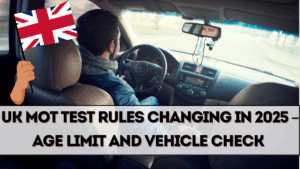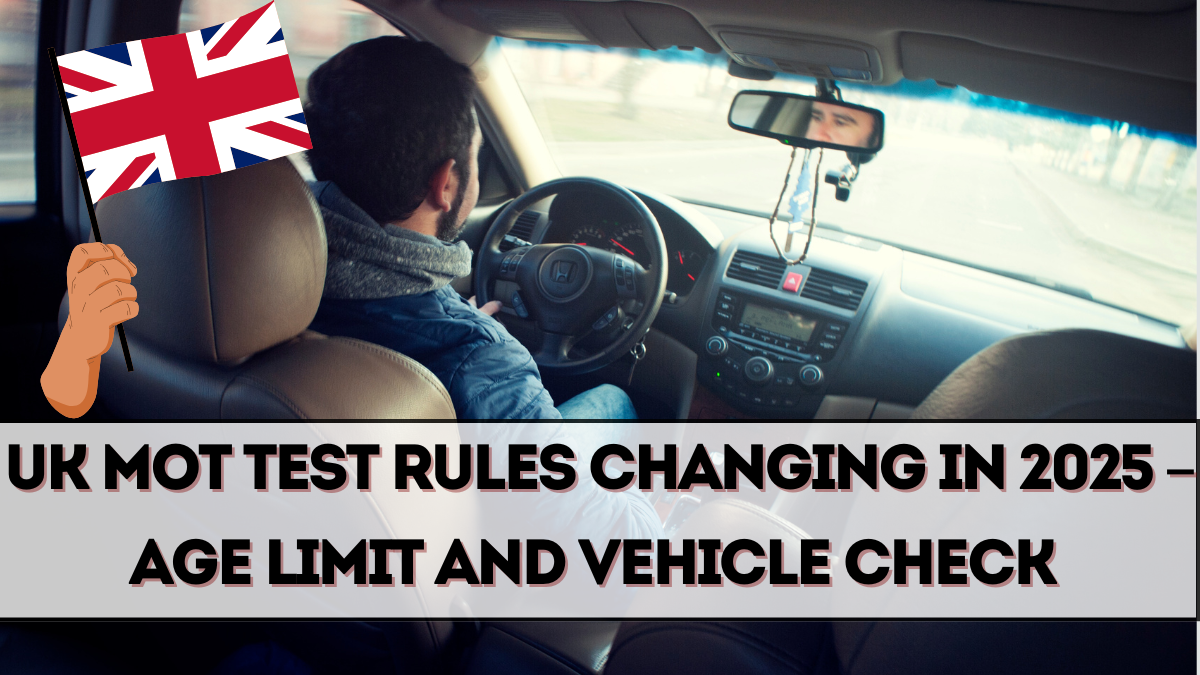Every car owner in the UK is familiar with the Ministry of Transport (MOT) test. It is the mandatory annual inspection that ensures a vehicle is safe, roadworthy, and compliant with environmental standards. In 2025, the government has announced a series of UK MOT rule changes that will directly impact millions of drivers. The changes cover the testing age, inspection process, and emissions checks, and have been introduced after a thorough review by the Driver and Vehicle Standards Agency (DVSA).
The UK MOT Rule Changes 2025 are designed to balance safety with modern technology, address the growing number of electric vehicles (EVs), and reduce emissions from older petrol and diesel cars.

Why MOT Rules Are Changing
The government has identified several reasons to update MOT laws:
-
Road Safety: Many road accidents involve vehicles with poor maintenance or faulty systems.
-
Emission Goals: With the UK aiming to phase out petrol and diesel cars by 2030, stricter emission checks are required.
-
Electric Vehicle Growth: Traditional MOT tests need updates to accommodate EVs and hybrids.
-
Public Demand: Drivers and road safety groups have long argued for clearer, more transparent MOT procedures.
By modernizing the MOT system, the government hopes to create safer roads while pushing for greener transport.
Key Changes in the MOT Test from 2025
The new MOT test introduces several updates.
-
Age Limit for First Test
-
Currently, cars require their first MOT after three years.
-
From 2025, the first MOT test will shift to four years after registration.
-
This change applies only to new vehicles sold after January 2025. Older cars remain under the three-year rule.
-
-
Stricter Emission Checks
-
Petrol and diesel cars will face tougher limits on carbon monoxide and nitrogen oxide emissions.
-
Diesel particulate filters (DPFs) will be checked more thoroughly, with instant failure for missing or tampered systems.
-
-
New EV and Hybrid Testing Requirements
-
Battery health reports will be included in MOT inspections.
-
Regenerative braking systems will be checked.
-
High-voltage wiring and safety components will undergo stricter testing.
-
-
Digital MOT Certificates
-
Paper certificates will gradually be phased out.
-
MOT results will be stored digitally and accessible via the DVSA portal.
-
-
Enhanced Safety Checks
-
Brake response and steering systems will face tighter inspection rules.
-
Cameras and advanced driver-assistance systems (ADAS) must be fully operational.
-
What This Means for Car Owners
For drivers, the UK MOT Rule Changes 2025 bring both opportunities and responsibilities.
-
Lower Costs for New Car Buyers: Pushing the first MOT to four years means new owners save on early inspection costs.
-
More Responsibility for Older Cars: Stricter emission and safety checks mean cars over five years old must be better maintained.
-
EV Owners: Battery condition will now play a role in roadworthiness certification, influencing resale value and insurance.
-
Digital Transition: Car owners will no longer need to carry paper MOT certificates, making the process more convenient.
Impact on the Auto Industry
These updates are not just about drivers. The automotive industry will also feel the impact:
-
Garages and Test Centers: Must invest in new equipment for EV and emission testing.
-
EV Manufacturers: Need to ensure vehicles are designed for easier MOT compliance.
-
Used Car Dealers: May see reduced values for older diesel and petrol models that struggle to pass stricter checks.
Overall, the industry is expected to adapt quickly, given the UK’s ambitious net-zero goals.
Public Reactions
The announcement has received mixed reactions:
-
Positive Feedback: Many welcome the tougher emission standards, citing health and environmental benefits.
-
Concerns from Petrol/Diesel Owners: Drivers of older cars worry about costly repairs to meet stricter requirements.
-
EV Owners: Largely positive, though some fear expensive battery inspections may impact resale prices.
The government assures that the changes will benefit society at large, emphasizing safety and sustainability.
International Comparisons
The UK is not alone in updating vehicle testing rules.
-
Germany: First MOT test after three years, followed by strict emission and safety checks.
-
France: Similar emission focus, with heavy penalties for diesel non-compliance.
-
Norway: Leading in EV inspections, requiring detailed battery diagnostics.
The UK’s new MOT rules position it in line with global leaders in road safety and environmental responsibility.
Preparing for the New MOT Rules
Car owners should take proactive steps ahead of 2025:
-
Regular Servicing: Keeping brakes, steering, and lights in top condition will avoid surprise failures.
-
Emission Awareness: Petrol and diesel owners should ensure their catalytic converters and filters are intact.
-
EV Owners: Battery health should be monitored through manufacturer diagnostics before MOT checks.
-
Digital Readiness: Familiarize yourself with the DVSA’s online portal for digital certificates.
By preparing early, drivers can ensure smooth compliance with the updated requirements.
The Future of MOT Testing
Looking beyond 2025, the MOT system is expected to evolve further:
-
AI and Automated Inspections: Use of smart diagnostics for faster and more accurate results.
-
Remote Monitoring: Cars may transmit diagnostic data directly to authorities.
-
Green Certification: Low-emission or zero-emission cars may benefit from reduced fees.
-
Integration with Insurance: Future MOT compliance could influence insurance premiums.
The UK MOT Rule Changes 2025 mark the start of a smarter, greener, and more efficient vehicle inspection process.
FAQs
When does the new MOT age rule start?
From January 2025, new cars will require their first MOT after four years instead of three.
What changes affect electric vehicles?
EVs will now face battery health checks, regenerative braking inspections, and high-voltage system tests.
Will I still receive a paper MOT certificate?
No, results will be digital by default, accessible online via the DVSA portal.
How do stricter emission checks affect older cars?
Older petrol and diesel cars may need costly repairs or replacements to pass the updated tests.
Click here to know more.
